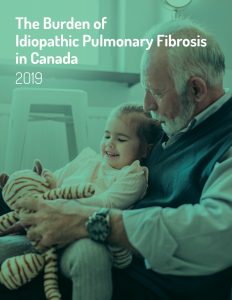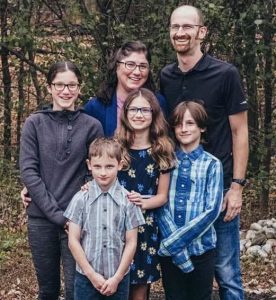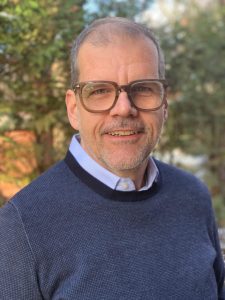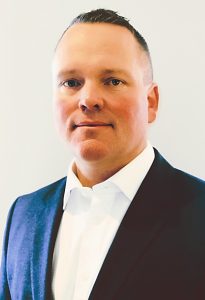New report reveals major gaps in care for Canadians with IPF
 The current state of care for Canadians living with idiopathic pulmonary fibrosis (IPF) is in great need of meaningful change to alleviate the considerable burdens associated with the condition, according to a newly released report, The Burden of Idiopathic Pulmonary Fibrosis in Canada.
The current state of care for Canadians living with idiopathic pulmonary fibrosis (IPF) is in great need of meaningful change to alleviate the considerable burdens associated with the condition, according to a newly released report, The Burden of Idiopathic Pulmonary Fibrosis in Canada.
The prevalence of IPF is higher in Canada than in many other developed countries and leads to the death of 5,000 Canadians each year.
Developed in collaboration with CPFF and Hoffmann-La Roche Limited, with input and guidance from a committee of IPF experts, The Burden of Idiopathic Pulmonary Fibrosis in Canada shows there is a lack of understanding of the disease even amongst physicians, which leads to delayed diagnoses and major gaps and disparities in the quality and access to healthcare resources. The report reveals the drastic differences in these resources from province to province, and the significant economic impact on both patients and the healthcare system.
The report outlines workable solutions – some which can be implemented right away – that could contribute to alleviating the current burdens of IPF. Here are some highlights of the recommendations, which are discussed in greater detail in the report:
- Improved education and awareness of IPF: for the public, patients, caregivers and health care professionals, particularly respirologists and general practitioners.
- Joint treatment management strategies: having these in place between community care and academic centers for individual cases will ensure that patients around the country have the opportunity to receive the best possible care, no matter where they are primarily treated.
- Earlier integration of multidisciplinary palliative care: this will result in reduced health care use in the last year of life and more home deaths. In addition, conversations around advanced care planning helps support partners to understand and learn about a patient’s goals and wishes and to feel more informed and supported.
- Expanded access to patient and support partner resources: access to patient and support partner peer support groups, patient empowerment resources, as well as palliative care, are critical to maintaining quality of life for patients and their loved ones. Digital access to such programs would lower barriers and broaden availability.
- Equality of care across provinces: quality of care should not be determined by where you live. To ensure quality of care throughout Canada, progressive health care decisions and dedication of resources to IPF treatment need to be established everywhere.
You can read the full report here.
Sharing the PF Community’s challenges with Ontario MPPs

Today, December 4, 2019, representatives from CPFF, people living with pulmonary fibrosis and their care partners, as well as health care professionals who treat those with the disease, are meeting with Ontario MPPs and public servants at Queen’s Park in Toronto.
Several meetings are planned throughout the day, including one with the Deputy Minister of Health, as well as a reception in the late afternoon for any MPPs and government staff interested in learning about pulmonary fibrosis and solving the current challenges faced by those living with the disease. Scheduled speakers at the reception include: Melissa Sulpher (see her story below); Kirk Morrison, CPFF Board Chair and Dr. Lee Fidler, Staff Respirologist, Clinician Quality Improvement, Sunnybrook Health Sciences Centre and University Health Network. Elected officials from each of the four political parties will also address the gathering.
Melissa will speak about her journey as a young woman with pulmonary fibrosis and the challenges it poses for her and her family. Kirk will speak about the recent report released in November about the Burden of IPF in Canada, and how CPFF is working to address the gaps in care for people living with PF in Ontario and their families. Dr. Fidler will talk about caring for people with PF in a very busy IDL clinic in Toronto.
All of the CPFF speakers will highlight the Foundation’s primary request of the Ontario Ministry of Health for funding for 10 registered nurses in five IDL clinics across the province. Given that PF patients are much more complex than typical patients seen by most community health care professionals, specialty nursing care can make a significant impact on the quality of care for these patients and their families. Currently, there is no funding for this role in ILD. However, many other conditions (oncology, pulmonary hypertension, cystic fibrosis) receive ministry funding to support having registered nurses in specialty clinics.
Our Recommendation
The CPFF recommends that the Government of Ontario allocate $1 million per year to ILD clinics in Hamilton, Toronto, London, Kingston and Ottawa to allow them to support the presence of two specialty nurses in each location at a cost of about $100,000 each per year, (including salaries, benefits and payroll taxes, as well as utilities, space, technology needs and support and other expenses.)
These nurses would be available in person, by phone and online, to patients of the clinic, as well as to health professionals in the community, especially those unfamiliar with pulmonary fibrosis. They would be a first line of inquiry for patients who have questions regarding their care – from access to oxygen, medication side effects and other medical issues. The ILD nurses would also help patients navigate access to pulmonary rehabilitation programs and palliative care, as well as ancillary services such as counselling, social workers and other social services.
These nurses would provide patients and their care givers with in-depth education and work with CPFF to facilitate support groups and help develop patient education programs and public awareness materials for people across the province.
Benefits to patients and the health care system
During our lobby day, and in subsequent meetings with MPPs, we will be emphasizing the benefits of the ILD nurses for patients, caregivers, other health care professionals and the health care system. The current Ontario government is focused on reducing “hallway medicine,” which often occurs in Emergency Rooms (ERs) and on increasing front-line care for patients. CPFF’s recommendation should align well with these government priorities.
We see the benefits of dedicated ILD nurses as follows:
- Quicker, easier and less expensive access to specialized care and support for PF patients and their caregivers, reducing anxiety and isolation.
- Improved patient communication, education and compliance, resulting in better quality of life.
- Another educational resource for the medical community, especially those unfamiliar with pulmonary fibrosis, including community respirologists and family physicians.
- Reduced visits to family physicians, emergency rooms, community respirologists and specialist respirologists in ILD clinics. ILD nurses will also improve patient end-of-life preparedness and help reduce hospital deaths.
Living a “normal” life with PF isn’t easy for mother of four

Just ask Melissa Sulpher, who at 38 years old, is not your typical person living with pulmonary fibrosis. Most are diagnosed, after several medical consultations, when they are in their 60s. Melissa’s case took quite some time to pin down, especially because of her age. Pregnant with twins when she first experienced symptoms of fatigue, shortness of breath and a cough, her doctor at first thought her breathlessness was a result of her pregnancy. After her delivery, they thought maybe it was post-nasal drip, or a sinus infection, or allergies or asthma.
“It sometimes felt like no one was listening. I would climb one flight of steps and have to sit down for at least five minutes before I could do anything else. That’s not normal,” says the former nurse.
After two years and periods of weekly doctor visits, a chest x-ray and a referral to a Kitchener respirologist, finally led to a diagnosis of pulmonary fibrosis. At 28 years old, Melissa had just had her third child and believes mould in her older home, along with a predisposition to the disease, was the cause of her condition. After her diagnosis, her family never again lived in the house, although no one else in the family was affected.
“I was so relieved to have a diagnosis,” says Melissa. “I wasn’t crazy, or lazy, or just weirdly obsessed with breathing. There was a reason I was obsessed with breathing. It was because I couldn’t breathe!”
Melissa does not have idiopathic pulmonary fibrosis; her PF is the result of chronic sensitivity pneumonitis, one of nearly 200 interstitial lung disease (ILD) conditions that can lead to pulmonary fibrosis. And it affects every part of her life.
She eventually had to cut back her nursing hours to part-time, and then had to stop working altogether two years ago. Although she receives some government assistance, “it’s certainly nothing like working full-time,” she says. She’s grateful that her drug therapies are covered for now and so is most of the cost of her oxygen. She is hopeful that once the drug is approved by Health Canada for her condition, it will also be quickly approved for coverage by the Ontario government.
Melissa finds the biggest impact has been on her family life. She and her husband Brian Heimpel have four children: 12-year-old twins Emily and Abigail; 10-year-old Thomas and seven-year-old Connor. There are a lot of things Melissa can’t do with them. “I often can’t go on field trips with them because I don’t know if there will be hills to climb or flights of stairs to go up. I can’t always walk my kids to school, and if I do, I might need a two-hour nap to recover,” she says.
If the family wants to do an activity together, for example attend a concert, they need to do a lot of planning. Melissa needs to know where they can park, how many flights of stairs there may be, and how long the concert will last. Will she have the stamina to last and time afterwards to recover?
“It changes relationships, too,” she says. “The people who love you don’t want to see you struggle to breathe. I’ll sometimes try to hide it if I can, but Brian is very observant, he knows when I need to rest or need help. And he’s super fantastic with the kids.”
What do they tell the kids? “At first, they were so little, it was just normal to them that I couldn’t do certain things. Now we refer to my condition as the ‘the black lung.’ We explain things to them as best we can, when they ask. And sometimes we don’t have the answers.”
She does her best to have as normal a life as possible. She does ferry the kids around to their activities and tries to minimize the effects of the cold and flu germs they bring home. “Our family probably has the cleanest hands going,” she laughs. While the kids recover quickly, it can take months for Melissa to recover from a cold.
She feels very fortunate to have stumbled into the care of Dr. Kolb at the Firestone Institute for Respiratory Health in Hamilton about seven years ago. “Having a rare disease comes with some unique challenges and one of them is finding experts who really know the latest research and treatment options. I can very honestly say that I receive world class care from a world class team of health professionals,” says Melissa.
In January 2018, Melissa was selected to participate in a clinical trial of nintedanib (OFEV) for patients with pulmonary fibrosis other than IPF. Recent trial results show nintedanib slowed lung function decline by 57 per cent across the overall study population. These results, and her own experience in the clinical trial, has given Melissa new hope that her slowing decline may give her time to benefit from new treatments and medical advances.
As a participant in the study, Melissa also had access to the clinical trial research coordinator, who was her go-to person with any questions or concerns, about anything. When the drug is approved for expanded use (it is already approved for treatment of IPF), by Health Canada, the clinical trial will be wrapped up. Along with CPFF, Melissa would like to see an ILD nurse available at the clinic, and by phone, as a patient resource. She will speak about this at an Ontario MPP reception on December 4 at Queen’s Park in Toronto.
“Having an ILD nurse in the clinic would be incredibly helpful,” says Melissa. “The specialists are very busy, with long waiting lists, so they are not always available. And while my questions may be simple for my ILD specialists to answer, health professionals in an ER department or walk-in clinic, or a family physician, cannot be expected to have the same level of knowledge of this complex condition. It would be a great relief, knowing there was a specialized nurse I could reach out to with my concerns.”
While she knows she may still need a lung transplant sometime in the future, Melissa feels her future is brighter than ever with progress in research and new treatments.
“I’m the kind of person that looks forward, rather than back.” says Melissa. “And right now I have a wonderful life.”
Some tips for others living with PF from Melissa
- Take the time you need to process your diagnosis. It’s a lot to take in, for you and your family.
- Stay as active as you can. Keeping in your best possible shape will make it easier to deal with future medical challenges (maybe even a lung transplant.)
- Have someone go to all of your medical appointments with you. They can add their observations of your condition to your health care team and take notes about what the professionals are telling you. You cannot do it all alone. Learn to accept help.
- Connect with others living with PF. The CPFF has support groups. You can also connect with others online. I also met some great people when taking a pulmonary rehab program.
- Get involved in the PF cause. Fundraise or advocate, be a resource for other patients, or share your story with the media. CPFF has plenty of opportunities for volunteers. It will give you a sense of empowerment and accomplishment.
- Live your life, the best you can each day.
The holidays are for family. Join ours today.
 You never have to face your journey with pulmonary fibrosis alone. While people living with PF, and their caregivers, rely on their supportive network of family and friends, they tell me how important they find the unique support that only their CPFF family can provide. That’s because they feel no one knows better the real impact of this debilitating disease than others who also live with it day in and day out. And for those who are separated from family and friends by distance or circumstances, our family can be a true lifeline.
You never have to face your journey with pulmonary fibrosis alone. While people living with PF, and their caregivers, rely on their supportive network of family and friends, they tell me how important they find the unique support that only their CPFF family can provide. That’s because they feel no one knows better the real impact of this debilitating disease than others who also live with it day in and day out. And for those who are separated from family and friends by distance or circumstances, our family can be a true lifeline.
As PF progresses, many aspects of daily living change. Moving, sleeping and breathing become more difficult. You are always tired. And, carrying around oxygen can feel embarrassing or uncomfortable in social settings. That can lead to withdrawal and isolation, which may lead to depression and feelings of helplessness. Your own family and friends understand your difficulties, and so does your PF family. Few things make us better than helping another in need. We are all stronger when we overcome our challenges together.
CPFF is here for you, offering help, hope and vital connections to the PF community. People living with PF and their caregivers talk to me about their immediate family and then their PF family, full of empathetic people they have connected with through support groups, rehab programs, education forums and other CPFF activities and events.
Many people describe getting involved with CPFF as part of their adjustment to living with the disease. Some become spokespeople on behalf of our community, sharing their stories with the media or elected officials and public servants. Others take part in clinical trials. Getting involved is empowering both for those living with PF and for their care partners.
You can count on CPFF to help you make connections. We are your hub to the PF community across Canada and we extend a warm welcome to you and to everyone touched by this life-changing disease. Join our PF family today. Visit our website at www.cpff.ca. Follow us on Facebook and twitter. As a reader of Hope Breathes Here, you are already connected to us.
We are able to support our PF family thanks to our generous sponsors and donors. In this season of giving, consider making a donation to our shared cause. As one of our donors told me recently, “You never lose when you give.”
From the CPFF family to yours, all the very best for this holiday season and in the new year ahead.
Sharon Lee, CPFF Executive Director
CPFF Board appoints two new directors

On behalf of the Canadian Pulmonary Fibrosis Foundation Board of Directors, Board Chair Kirk Morrison, is please to announce the appointment of two new directors, Gregory Martin and Todd Georgieff.
Todd, a resident of Montreal, Quebec, is a collaborative, strategic leader and excellent communicator with almost 30 years of experience in pharmaceutical drug development in North America, Europe, Latin America, Asia and Australia. He is currently an industry collaborations lead at Roche and Genentech. He holds a Bachelor of Science in Pharmacy degree from the University of Toronto and an MBA from York University.
On a personal note, Todd’s father-in-law passed away in February 2019 after a nine-year battle with idiopathic pulmonary fibrosis.
“I am happy to be joining CPFF to help lead the organization through its next stage of growth,” says Todd. “I have spent my whole career in healthcare, first as a hospital pharmacist and then managing global drug development programs for major pharma companies. I am hoping to apply some of that learning and experience to support patients, families, health providers and researchers working in this under-recognized disease area.”

A native of Calgary, Alberta, Gregory Martin currently holds the position of Director of Sales with TELUS. He has also held responsibility for the TELUS relationships for many key charitable foundations within Calgary, including STARS, Boys & Girls Club, and In from the Cold, as well as being an active participant in TELUS’ We Give Where We Live and We Day. Greg is also a certified coach and volunteer for the Bow Valley Hockey Society and a leader in the #endbullying campaign.
“I wanted to join CPFF as my father, Richard Martin, passed away from this deadly disease on October 01, 2018,” explains Gregory. “I witnessed first-hand the effects of IPF and do not wish this to happen to any other human being nor their family members.
“Joining the board will allow me to support Pulmonary Fibrosis in Canada and across the globe in terms of raising awareness, educating the public and obtaining funding for research, patient programs and ultimately finding a cure.”
Gregory holds a degree in Business Operations and pursues his passion for continuous growth by being an active leader and supporter in developing people, businesses and non-profit organizations.


